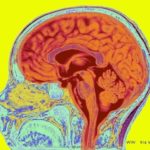According to a recent study, traits associated with alcohol use disorder may be caused by a dysfunction in a particular circuit in the brain. The findings appeared in the journal Biological Psychiatry.
“We want to understand how the brain normally regulates drinking, so we can answer questions about what happens when this regulation isn’t happening as it should,” said Lindsay Halladay, the study’s lead author.
“This study takes us a step further in understanding the brain mechanisms underlying compulsive drinking,” added Andrew Holmes, co-author of the study.
To get a more comprehensive look at how the brain regulates drinking, researchers used rodents, prompting them to press a lever for an alcohol reward. Electric shocks were then administered based on varying, conflicting situations.
“We conducted in vivo electrophysiological recordings in mouse ventral (vmPFC) and dorsal (dmPFC) to obtain neuronal correlates of footshock-punished EtOH-SA,” the study says.
“Ex vivo recordings were performed in NAcS D1-positive MSNs receiving vmPFC input to examine punishment-related plasticity in this pathway. Optogenetic photosilencing was employed to assess the functional contribution of the vmPFC and dmPFC, vmPFC projections to NAcS or BLA, to punished EtOH-SA.”
The findings showed how vmPFC is significant for regulating EtOH-SA after punishment, resulting in a better understanding of alcoholism.
“We found a group of neurons in the medial prefrontal cortex that became active when mice approached the lever but aborted the lever press,” Halladay explained.
“These neurons only responded when the mice did not press the lever, apparently deciding the risk of shock was too great, but not when mice chose alcohol over the risk of shock. This means that the neurons we identified may be responsible for putting the brakes on drinking when doing so may be dangerous.”
“Collectively, these data provide correlative and causal evidence supporting an important contribution of the vmPFC in regulating EtOH-SA in the face of potential punishment,” the findings concluded.
“These findings advance our understanding of the neural circuits that may underlie compulsive drinking.”


